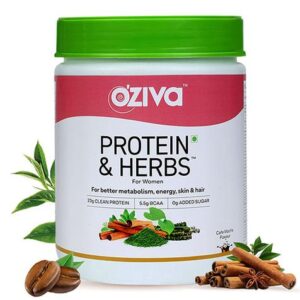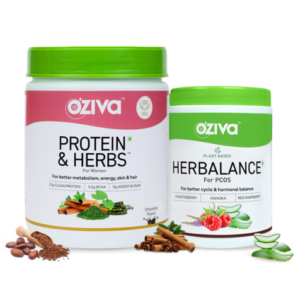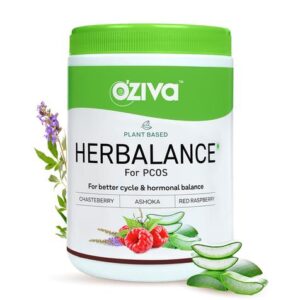PCOS or polycystic ovarian syndrome, is a disorder that affects women’s ovaries, the reproductive organs that generate progesterone and estrogen hormones that help regulate the monthly cycle, as well as minor amounts of hormones like inhibin, relaxin, and androgens.
Women suffering from PCOS produce more masculine hormones as compared to other women. This results in imbalances in hormones making it difficult to get pregnant.
What is PCOD?
PCOD (Polycystic Ovarian Disease) is a medical disorder in which a woman’s ovaries generate enormous quantities of immature or partly developed eggs, which develop into cysts in the ovaries over time. As a result, the ovaries become larger and emit more male hormones (androgens), resulting in infertility, irregular menstruation periods, hair loss, and abnormal weight gain. PCOD can be managed with dietary and lifestyle changes.
This disorder is only limited to the female reproductive system.
What is PCOS?
PCOS (Polycystic Ovary Syndrome) is a metabolic illness in which a woman’s reproductive years are impacted by hormonal imbalance (between ages 12 and 51). Females may miss menstrual cycles, have irregular ovulation, make it difficult to become pregnant, and experience abnormal hair growth on the body and face, all of which can cause a change in metabolism, resulting in an increased risk of obesity, Type-2 diabetes, and other chronic health problems.
So basically, this becomes a metabolic disorder which then involves many other systems in our body. It is much more intense, extensive & complicated as compared to PCOD.
PCOD and PCOS are not the same, despite having quite similar symptoms.
While PCOS is an endocrine disease (also known as metabolic syndrome) that is more significant in nature, PCOD is mostly caused by hormonal imbalance and may be treated with a mix of the appropriate food and exercise.
PCOS has several causes.
Although the exact cause of PCOS in women is unknown, the following are some major factors:
Excess insulin production: high insulin levels in the body can lead to an increase in androgen production (a male hormone that is very low in females), which can make ovulation difficult.
Excessive androgen hormone production: The ovaries generate unusually high levels of androgen hormones, which can cause acne and hirsutism (hair growth on the face and body)
Low-grade inflammation: According to a new study, women with PCOS have low-grade inflammation, which leads to an increase in androgen production, which might cause blood vessel or cardiac problems.
Women with PCOS have a genetic link that may be traced back to their ancestors.
Difference between PCOD & PCOS
Some women may be confused about whether PCOD and PCOS are the same things or not. Both medical diseases are linked to ovaries and hormonal imbalances in women of reproductive age (between the ages of 12 and 51) and have similar symptoms. Here are some key distinctions between PCOD and PCOS that every woman should be aware of:
PCOD is a prevalent condition that affects 10% of the world’s female population.
PCOS is a significant medical disorder that affects 0.2 percent to 2.5 percent of the world’s female population.
PCOD is a disorder in which the ovaries generate a large number of immature or partly developed eggs as a result of poor lifestyle choices, obesity, stress, or hormonal imbalance.
PCOS is a metabolic disease that can cause anovulation, which is when the ovaries stop producing eggs altogether.
PCOD has no effect on a woman’s fertility; she can still ovulate and become pregnant with little assistance, and with the right medicine, she can finish the pregnancy.
PCOS has a significant impact on women’s fertility. Women with PCOS are unable to ovulate on a regular basis, making pregnancy difficult. If they become pregnant, they have the risk of miscarriage, early birth, or pregnancy problems.
PCOD does not have any major side effects.
In its latter stages, PCOS can lead to major consequences such as type 2 diabetes, heart disease, high blood pressure, and endometrial cancer.
PCOD – The cysts are less than 10.
PCOS – The cysts are more than 10.
Can PCOD be cured?
PCOD is not a life-threatening condition, but there is no treatment. However, it can easily be reversed and maintained. Maintaining a healthy weight, eating a diverse carbohydrate diet, including healthy fats & protein, exercising regularly, and being active will aid in the management of PCOD and its underlying symptoms. Females should see a gynaecologist and primary care doctor on a regular basis to ensure a healthy life in the future.
Can PCOS be cured?
PCOS (Polycystic ovary syndrome) is a significant medical disorder that affects women. While it cannot be totally cured, the symptoms associated with it can be treated to improve quality of life.
If a woman is diagnosed with PCOS, she should monitor her blood pressure, blood sugar levels (if she has type 2 diabetes), cholesterol levels, and other probable consequences on a frequent basis.
PCOS also should be managed with lifestyle changes. Though a little more complicated, and would need some patience & discipline.
Managing PCOD/ PCOS
Managing PCOD/PCOS involves a combination of lifestyle modifications, dietary changes, regular exercise, and sometimes medical interventions. Here are several key points on managing PCOD/PCOS:
- Healthy Diet: Adopt a balanced diet rich in whole grains, fruits, vegetables, lean protein, and healthy fats. Limit processed foods, refined sugars, and saturated fats to help regulate insulin levels and manage weight.
- Regular Exercise: Engage in regular physical activity such as brisk walking, jogging, cycling, or yoga to improve insulin sensitivity, aid weight management, and regulate menstrual cycles.
- Weight Management: Maintaining a healthy weight through a balanced diet and regular exercise is crucial as excessive weight can worsen PCOD/PCOS symptoms.
- Stress Management: Practice stress-reducing techniques like yoga, meditation, deep breathing exercises, or hobbies to manage stress levels. High-stress levels can exacerbate hormonal imbalances.
- Regular Monitoring: Regularly visit a healthcare provider for check-ups, monitoring of hormonal levels, and discussion of any new symptoms or concerns.
- Avoid Smoking and Excessive Alcohol: Both smoking and excessive alcohol consumption can aggravate PCOD/PCOS symptoms. It’s advisable to abstain or limit these habits.
- Regular Sleep Patterns: Maintain regular sleep schedules as adequate sleep can positively impact hormone regulation and overall well-being.
Remember, the management approach for PCOD/PCOS can vary for each individual. Consulting a specialist is essential to determine the most suitable management plan based on specific symptoms and health history.
Role of OZiva HerBalance for PCOS
OZiva HerBalance for PCOS is a specialized supplement formulated to address PCOS-related hormonal imbalances. It contains standardized herbal extracts and ingredients specifically designed to regulate hormonal balance, support menstrual cycles, and alleviate PCOS symptoms. HerBalance targets estrogen, progesterone, testosterone, and related hormonal issues associated with PCOS.
Key Ingredients and Their Roles:
- Shatavari: This herb aids in increasing fertility and alleviating stress, offering support to women struggling with PCOS-related infertility issues.
- Chasteberry: Known for its ability to improve progesterone levels and reduce facial hair growth, Chasteberry contributes to hormonal balance in women with PCOS.
- Aloe Vera: With its skin-cleansing properties, Aloe Vera helps control acne and promotes clearer skin, addressing one of the common concerns among individuals with PCOS.
- Gokhru: This herb stimulates ovulation and assists in reducing cyst formation, crucial factors in managing the symptoms and complications of PCOS.
- Ashoka: Offering anti-inflammatory benefits, Ashoka helps in managing inflammation while boosting estrogen levels, aiding in hormone regulation.
- Flax Seed: Rich in nutrients, Flax Seed promotes hormonal balance and improves menstrual cycles, contributing to overall reproductive health in PCOS.
Frequently Asked Questions (Q&A) on OZiva Plant Based HerBalance PCOS:
- How is OZiva Plant Based HerBalance PCOS different from other brands in the market?
OZiva Plant Based HerBalance PCOS sets itself apart through a unique formulation comprising 8 potent Herbal extracts, 6 potent herbs, Inositol, chromium, and 2 digestive enzymes (Papain and Bromelain). This blend is specifically designed to address PCOS by reducing insulin resistance, alleviating abdominal bloating during menstrual periods, and offering a more comprehensive approach to managing PCOS symptoms effectively.
- What are the side effects?
Formulated with plant-based ingredients within their effective dosage limits, OZiva Plant Based HerBalance PCOS is considered safe for consumption with no proven side effects, even with prolonged usage.
- Which age group of patients can take it?
Recommended for PCOS patients within the reproductive age group (18-45 years), the product is tailored to address the specific hormonal needs of women within this demographic
- Can a diabetes or hypertension patient take it?
OZiva Plant Based HerBalance PCOS is suitable for diabetics and hypertensive individuals. The inclusion of Inositol aids in reducing insulin resistance and blood glucose levels. Additionally, it uses black salt and pink salt with lower sodium content, making it safer for hypertensive patients. However, consulting with doctors is advised, considering individual health conditions.
- Can it be taken during the menstrual cycle?
Yes, the ingredients in OZiva Plant Based HerBalance PCOS assist in reducing headaches, body aches, and heavy bleeding commonly observed during menstrual periods in PCOS.
- Can it be given with other hormonal pills?
OZiva HerBalance PCOS is effective on its own in treating PCOS. However, if other hormonal pills are necessary, it can be consumed alongside them.
- Is this product applicable for the PCOS condition wherein the estrogen level drops down below the normal levels?
HerBalance PCOS aids in maintaining optimal levels of reproductive hormones, including LH:FSH ratio, Estrogen, and Testosterone. It contains Shatavari, an adaptogen that balances high estrogen levels and regulates them to normal levels in both scenarios.
- Does this product help in dealing with heavy bleeding during PCOS?
Yes, heavy bleeding and irregular menstruation in PCOS are often due to hormonal imbalances affecting the endometrial lining. The herbal extracts in HerBalance PCOS assist in reducing heavy menstrual flow and improving cycle regularity by balancing hormonal levels.
The OZiva Plant Based HerBalance for PCOS is an all-encompassing supplement tailored to address the specific needs of individuals dealing with PCOS. Its unique blend of potent herbal extracts, Inositol, chromium, and digestive enzymes presents a promising solution in managing PCOS symptoms effectively. With its safety profile and comprehensive approach to hormonal imbalances, this product stands out as a reliable aid for those navigating the challenges of PCOS.
For individuals navigating the challenges of PCOS or PCOD, understanding the differences between the two conditions and taking proactive steps towards managing these conditions are crucial for long-term health and well-being. OZiva HerBalance for PCOS stands as a specialized aid, offering targeted support in managing PCOS-related hormonal imbalances and promoting a healthier lifestyle.
Read More: Diet Chart for PCOS
Last modified: December 12, 2023








